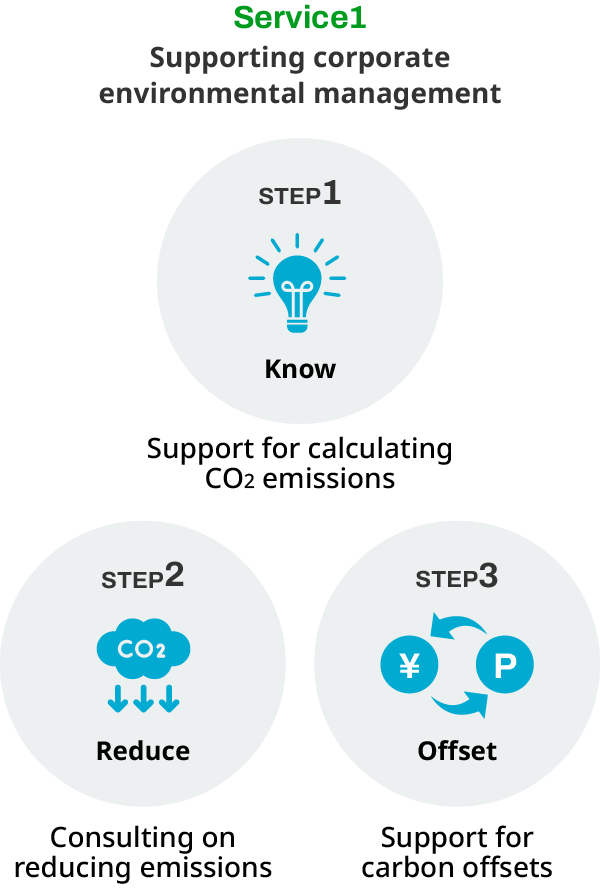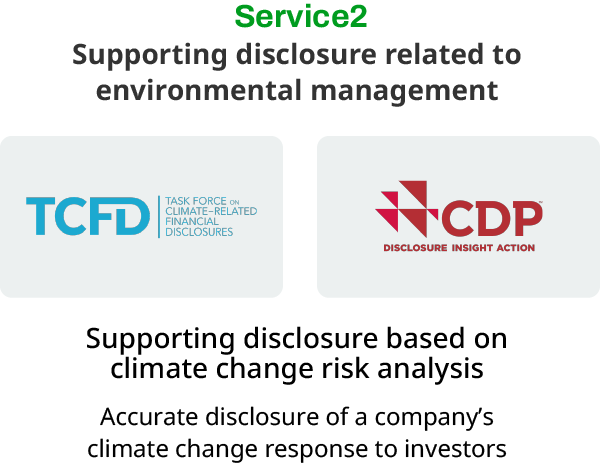
special feature Environmental Management Support
Building a sustainable future by supporting corporate efforts to address climate change
vol.03
Today, in the face of global issues such as climate change, loss of biodiversity, and water
security, it is essential not just for national and local governments, but businesses and
individuals to shoulder the responsibility of taking practical measures to address environmental
problems. In the area of climate change, nations around the world have declared their intentions
to achieve carbon neutrality—effectively zero greenhouse gas emissions—by 2050. Growing numbers of
businesses regard sustainability matters, including response to climate change, as important
business topics. Some industries face the need to go still further—to transform their business
models and management strategies.
Around the world, investors have expressed strong interest in ESG management*1 and various countries have actively used
ESG assessment and made disclosures based on the TCFD*2 recommendations. Japanese firms find
themselves lagging behind global companies in the area of climate change response.
With these conditions in mind, blue dot green Inc. supports corporate activities essential to
climate change response and environmental management, including calculations of CO2 emissions,
carbon offsets, and responding to the CDP*3 and TCFD initiatives. We will help realize a
carbon-neutral society in partnership with numerous firms.
*1 ESG management: Management to achieve sustainable growth by reflecting consideration for the environment and society and ensuring sound governance
*2 TCFD: Task Force on Climate-related Financial Disclosures, an initiative established by the Financial Stability Board (FSB) to encourage disclosure by companies of climate-related risks and opportunities
*3 CDP: Carbon Disclosure Project, a project formed by institutional investors to encourage companies to disclose climate change strategies and environmental data, including concrete greenhouse gas emissions figures
Percentage of companies in Japan declaring their support of the TCFD recommendations
16%
Comprehensively supporting corporate response to climate change
As a team of experts who support environmental management
undertaken by a wide range of businesses, blue dot green boasts specific strengths in the area of
consulting on responding to climate change. Before reducing their own CO2 emissions, companies must
calculate accurate total CO2 emissions figures for their business activities. Next, they must
identify hot spots where emissions should be reduced and demonstrate CO2 emissions reductions
achieved through reduction efforts, use of carbon offsets, or other measures. For such initiatives,
blue dot green provides comprehensive support.
In addition, companies must disclose information on their climate change initiatives under
international frameworks such as the CDP and TCFD. Using the CDP framework, they can visualize
issues in their own environmental management through disclosures on environmental initiatives;
through the TCFD framework, they can draw roadmaps to stronger corporate value through disclosure of
initiatives that target the future. While specializing in the preparation of CDP response forms,
blue dot green offers consulting on scenario analysis, matters of the utmost importance under the
TCFD framework.


Toward a sustainable future by helping to minimize climate change risks
The Global Risk Report 2022 issued by the World Economic Forum identifies the following as the most
severe global risks of the coming decade: 1) climate action failure, 2) extreme weather, and 3)
biodiversity loss. As these items suggest, climate-related risks dominate.
By allowing companies to visualize CO2 emissions of company products and services and providing
support for climate change and biodiversity initiatives, blue dot green helps reduce climate risks
and realize a sustainable future.
column
Now that companies need to reduce their environmental impact, blue dot green's expertise is increasingly important
Achieving global carbon neutrality will require companies not just to comply with regulations,
but to institute reforms actively on their own. Doing so will lead to rapid growth in their
corporate value while making them resilient to the various risks that may emerge in the
future.
To date, companies in Japan, whether large or small, have pursued autonomous efforts to reduce
the environmental impact of their business activities through promoting environmental
management systems like those formulated by ISO 14001 and the Ministry of the Environment's
Eco Action 21 initiative. The steps of setting targets and developing strategies based on
ascertaining the current situation and organizing internal structures to execute and manage
them do not differ fundamentally from the items demanded in disclosures in recent years.
In light of the broad range of business activities subject to such disclosure demand as well
as the needs for analysis and calculation of future impact and appropriate wording of
disclosures, experts like blue dot green in recent years are playing increasingly important
supporting roles. The company's sphere of activities can be expected to broaden still further
if the need for disclosure widens to include each product and topics beyond greenhouse
gases.
I look forward to seeing blue dot green grow still further in the future, as the wealth of
experience based on its track record and its flexible support options suited to the individual
phases of corporate initiatives are put to further use.
Hideka Morimoto Professor, Waseda University Faculty of Law
As former administrative vice minister for the environment, he was involved in environmental policy for 40 years. He has been engaging in responding to the damage caused by Minamata disease and asbestos, as well as recycling to address issues such as ocean plastic waste while participating in the establishment and operation of the Nuclear Regulation Authority and recovery and revitalization in Fukushima Prefecture since the Great East Japan Earthquake. His publications include Satochi kara no henkaku: Chikyu kankyo jidai no furusato zukuri (Reforms from mountain villages: Community development in the global environmental age) (coauthor; Jiji Press Ltd.). He is a graduate of the departments of private law and political science of the University of Tokyo Faculty of Law.
